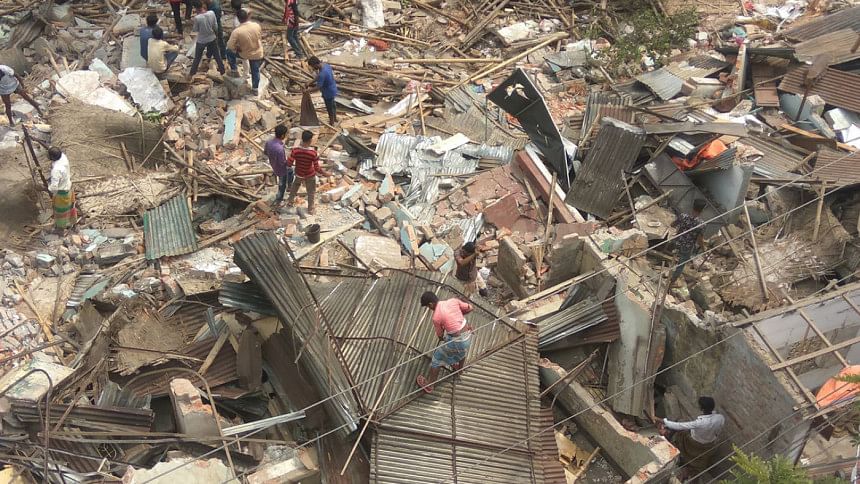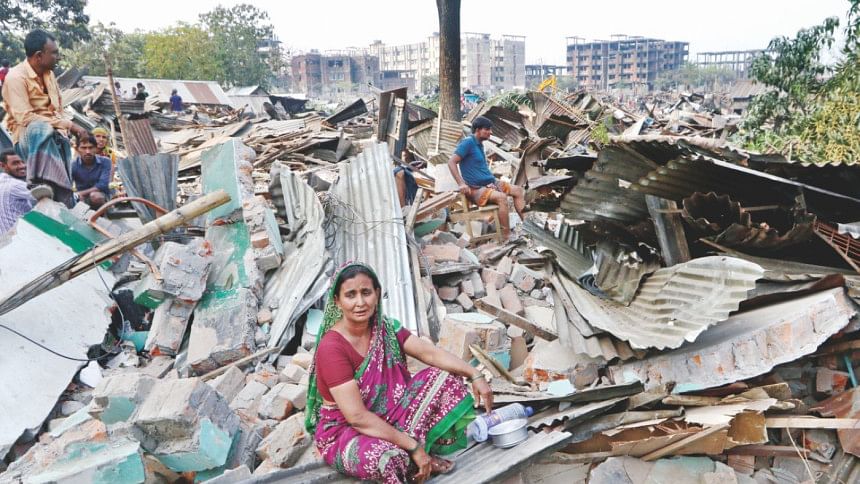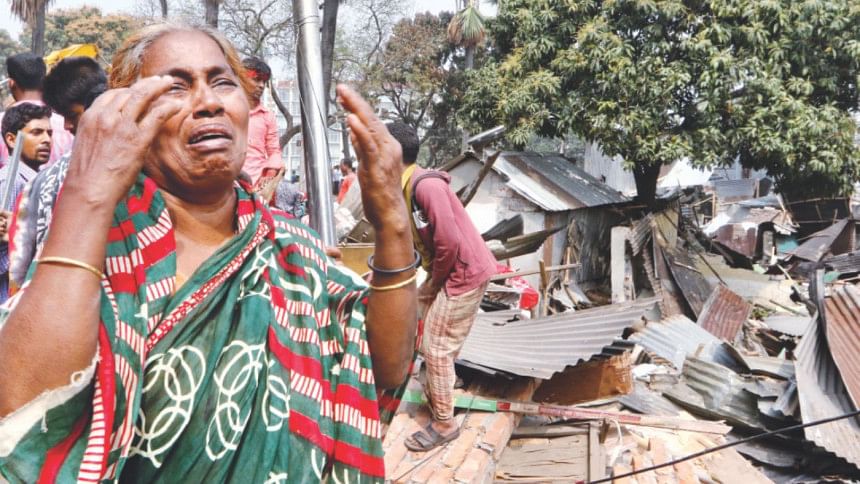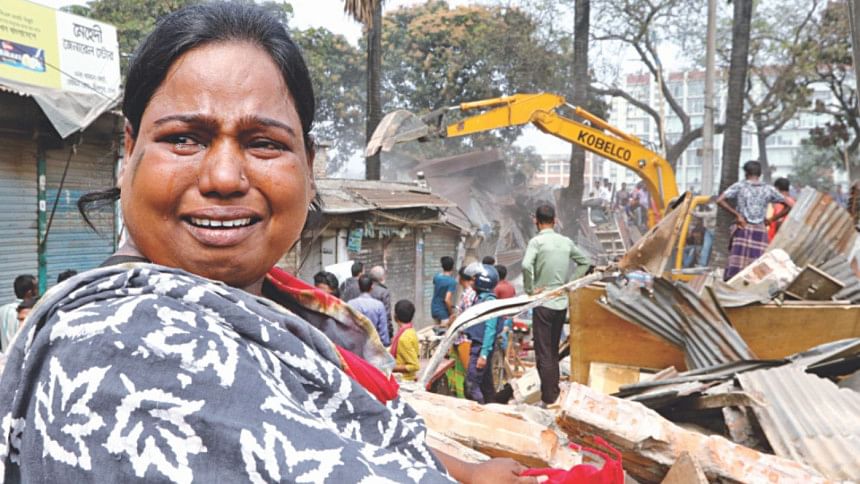Thousands left homeless
Barely a day after his birth, he found himself in the midst of rumbling bulldozers destroying the little world around him. The next day, the baby, who was yet to be named, and his mother Tanjila Begum, 24, were homeless.
They were among the roughly 10,000 people evicted from the capital's Bhasantek slum during a drive by the National Housing Authority (NHA) launched on Tuesday.
Tanjila's husband, Iqbal Hossain, is a fish seller. With two children and a wife to support, he was desperately looking for a new home at different places of the city.
The family spent yesterday under the open sky in the heart of the capital of a country which boasts of development in all spheres. They have been surviving on chira, muri and biscuits.

“A new house isn't that easy. The rent is too high,” he said while talking to The Daily Star near the slum.
For his shanty, he had to pay Tk 2,500 as rent per month whereas most available units outside the slum are charging around Tk 10-15,000.
Tanjila and her sister Rashida, 22 -- also a resident in the area -- claimed that the NHA drive did not follow the procedures.
“We were not given any legal notice. There was a verbal announcement a week ago but the man we rented the house from said nothing would happen as there was an injunction [order],” Rashida said.
Tanjila said they were not even given the time to save their valuables.
Tanjila, who lived in the slum for five years, said they worked hard and saved money over the years to buy a few things, including their furniture, a 14-inch colour television and a small refrigerator.
Now, all of those, along with their hopes and aspirations, lie buried under the rubbles.
At the moment, they have no idea what to do. Their last resort is to return to their village in Kishoreganj, where they have no land but do have a few relatives who may lend a helping hand.

“I saw on television how the government supported the Rohingyas. They were given land, a house and even daily rations. But what did we, as citizens, get?” Rashida asked.
For now, Rashida and Tanjila sit guarding a few of their belongings, while their husbands roam around looking for a place to live.
Such scenes are common here.
Visiting the area yesterday, our correspondent found the streets lined with rubble or several hundred women and children sitting with their belongings.
Some complained that their belongings were stolen during the eviction.
Women were seen talking to their husbands over phone, enquiring about whether a house had been found. They all awaited news of a new roof over their heads being found, but most of these phone conversations apparently ended in disappointment.
A resident informed that some families were looking for a single three-bedroom flat to share. House-owners, however, denied renting out to them. He claimed they were told that the houses would not be rented out to “poor people” like them.
Fifty-year old Shamsurnahar sat outside the remnants of her house. Worry was etched across her face.
She said she came here after she was married at 14. Since then, the demolished two-bedroom house behind her had been the only home she had known.

“My husband is a private car driver. The money he had earned was supplemented by three small shops we rent. Now, all of that is destroyed. They did not let us save anything,” she said.
Shamsunnahar has two children -- a daughter who is appearing for her HSC and a 30-year old son.
The mother of the two can no longer promise her children a roof over their head and that knowledge seemed to have broken her.
Her brother-in-law, Deen Mohammad, said he was born in this house. “This was our ancestral land. We had 30 bigha here which the government acquired in the 70s to house the Biharis. Since that did not happen, we moved back in and have been living here ever since.”
Deen, who claimed to be a freedom fighter, also said there was injunction against the eviction, but he could produce no documents to support the claim. “Everything is buried under there. I will have to dig it out,” he said.
“We would have been satisfied if we had been served a legal notice of eviction. But all they did was announce it by megaphone a week ago and then they came with the bulldozers,” Deen added.
Meanwhile, Shamsunnahar's husband called to inform her that he had found a house in Dewar Bazaar for Tk 12,000. Shamsunnahar laughed at this, saying she did not know how they could afford it.
Shamsunnahar and Deen now feel they have nothing to look forward to; except, the rubble of their house a mango tree, which blooms with flowers above them. Even the tree will be gone soon and soon nothing will be left of over three decades of memory.
During the first of the eviction, an NHA official said in 1970 the government acquired the land and since then it had been grabbed and used illegally by locals. He added that although several notices have been given to the slum dwellers, they still did not vacate the area.
The housing authority and police asked the slum dwellers many times, including the night before the drive, to vacate but they did not pay any attention, he said.

Many of the dwellers could not save their valuables as they were out of their houses for work, Javed said.
Abdullah Hil Baki, subdivisional engineer (Dhaka) of NHA, said the drive began Tuesday morning and will continue for a project titled “Griho Shuchona Flat” for building construction.
Elsewhere, many of the residents were seen planning to return to their village homes. They were selling whatever they had at the marked-down prices.
Sohel Rana, a rickshaw puller, had his wife and one five-month-old daughter, with him. He was haggling with a pick-up truck over the fare to go back home to Itna in Kishoreganj.
The pick-up driver asked for Tk 10,000 -- trip which usually cost around Tk 2,500. Sohel refused because he could not afford it.
“I could only save my TV and a bed. Everything else was bulldozed. Now I have to go back home as I have nothing left here,” he said.
He said none of his relatives had taken him in. “When there had been a fire earlier, many people came to help us. Now, no one is here. Not even the journalists. Not even the politicians.
“We are voters in this area. But no one cares about us.”
Seeing the deluge of people leaving, many bus service operators have set up counters in the area.
The demand for tickets is high but the fare has remained unchanged.
Abdus Sattar, a bus counter supervisor for a bus to Kishoreganj, said, “The locals have been looking for a way back home so we came here. We did not increase the price of the tickets.
“Our buses will come here to pick up the passengers. They don't have to go anywhere for it,” he added.
As the man was talking to this correspondent, officials from the NHA and the police stood stoically yards away, while the bulldozers continued to raze down structures amidst tears and shouts of slum dwellers.

 For all latest news, follow The Daily Star's Google News channel.
For all latest news, follow The Daily Star's Google News channel. 







Comments